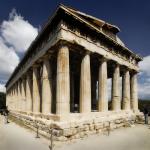|
This section contains 856 words (approx. 3 pages at 300 words per page) |

|
Man and Myth. The life and views of Pythagoras are hard to reconstruct, since the man himself inspired a cult and became quickly shrouded in legends spun by his disciples. According to Empedocles, who was strongly influenced by his thinking, Pythagoras "stretched his mind and easily saw each and every thing in ten or twenty generations." His followers were concentrated in the southern Italian town of Croton and remained active as a group from approximately the year 530 through the fourth century B.C.E. In general, they tended to divide themselves into mystics on the one hand and mathematicians on the other. The main concern is with the latter group, though both shared the same premise that the essence of all things could be expressed in numbers.
Structure and Form. The chief proof for this claim that reality...
|
This section contains 856 words (approx. 3 pages at 300 words per page) |

|




